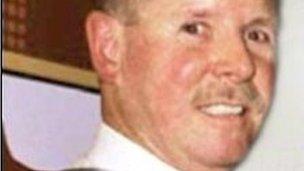Constable Stephen Carroll murder trial 'should be stopped'
- Published

Constable Carroll was shot dead after responding to a 999 call
Defence lawyers for the two men charged with the murder of Constable Stephen Carroll have argued the trial should be stopped due to a lack of evidence.
They have argued that the prosecution case was weak and inconclusive and said "a jury must convict on substance rather than suspicion."
Constable Carroll was shot dead in Craigavon in March 2009.
Brendan McConville, of Glenholme Avenue, Craigavon and John Paul Wootton of Collindale, Lurgan, deny the murder.
On Wednesday, the defence team again attacked the evidence of a man known as Witness M, who claims to have seen 40-year-old Mr McConville at the murder scene half an hour before the shooting.
Mr McConville's barrister said the evidence was of poor quality and a case of mistaken identity.
He also argued that a coat that had Mr McConville's DNA on it and found in the alleged getaway car could have been worn by up to five other people.
The lawyer told Belfast Crown Court that a tracking device hidden on the car by the Army had shown that it had not been near Mr McConville's home on the day of the shooting.

Constable Stephen Carroll was shot dead in March 2009
"There was always a danger," he said, "of seeking to manufacture a hypothesis to match the evidence".
In conclusion, he added: "The essence of the secondary submission being that the inferences drawn are weak and inconclusive and the same ought not to be combined so as to leave the jury to convict on suspicion rather than real substance."
In opening his final submissions, a barrister for 20-year-old John Paul Wootton claimed there was a breakdown, a distortion, in the forensic evidence over a coat found in his car and the legal proofs absolutely essential to link it with the shooting and Mr Wootton.
Later, he accused the scientists involved of "lacking in candour and frankness as to the validity of their conclusions".
He said it was "lamentable" that those involved have failed to acknowledge openly in court their failures and the invalidity of their results remained unknown to them for over three years.
The lawyer further claimed that there was no scientific basis for the findings concerning firearms residues and those allegedly found in the back of Wootton's car and supposedly on a jacket.
He claimed it was "all conjecture and not supported by evidence".
He also claimed that when the tests were being carried out, even the most basic procedures, "that even an intern would have been aware of", were not taken.
The barrister further claimed that the number of particles recovered from the jacket were "not consistent with the person wearing that jacket, firing a firearm on the 9 March, or consistent with a person firing that firearm, seeking to conceal that firearm in the jacket wishing to take it from the scene".
He added the forensic results were also not consistent with the jacket being used to wipe that weapon after it had been discharged.
- Published28 February 2012
- Published27 February 2012
- Published22 February 2012
- Published13 February 2012
- Published8 February 2012
- Published2 February 2012